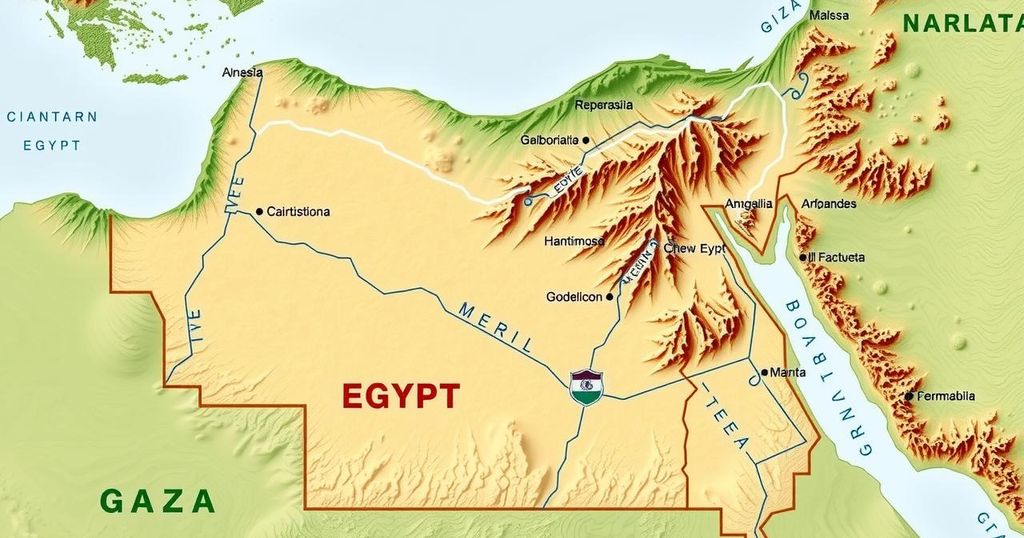Egypt’s Firm Rejection of Gaza Administration Proposal
Egypt has decisively rejected Israeli opposition leader Yair Lapid’s proposal for Egypt to manage Gaza, citing national security concerns and a commitment to Palestinian rights. This aligns with Egypt’s long-standing opposition to any plans that reinforce occupation. Cairo believes that a comprehensive Palestinian solution is essential, rather than assuming control that could further complicate security dynamics.
Egypt has firmly rejected the recent proposal suggested by Israeli opposition leader Yair Lapid. This proposal intended for Egypt to administer the Gaza Strip for up to 15 years in exchange for the cancellation of Egypt’s external debts. The Egyptian Foreign Ministry’s response emphasized that such proposals attempt to undermine the Arab world’s stance, asserting the necessity for Israel to withdraw from occupied Palestinian territories and to establish an independent Palestinian state.
This rejection is consistent with Egypt’s longstanding position regarding the Palestinian issue, as Egypt has continuously opposed any proposals that reinforce occupation or undermine the Palestinian cause. This includes Egypt’s refusal to participate in international forces within Gaza, showcasing its steadfast opposition to taking on security or administrative responsibilities in the area.
The notion of Egypt managing Gaza is not new, stemming from Egypt’s governance of the territory between 1948 and 1967. Initially, Gaza came under the All-Palestine Government, supported by Cairo but lacking significant international recognition. Consequently, Gaza was placed under direct military rule by Egypt without official annexation.
During this period, Gaza faced significant economic and humanitarian challenges, aggravated by an influx of over 200,000 Palestinian refugees following the 1948 Nakba. Egypt had no long-term political strategy for governing Gaza, viewing its administration as a temporary duty until a comprehensive solution to the Palestinian issue was reached.
Egypt’s administration of Gaza concluded after the 1967 war when Israel occupied the enclave along with the West Bank and Sinai. Post-occupation, Egypt refrained from direct involvement in Gaza’s administration, although it maintained a crucial role in security matters and political mediation.
Cairo’s rejection of Lapid’s proposal is primarily driven by concerns regarding national security. Egypt fears that managing Gaza would impose a significant security burden, particularly with the internal dynamics of Gaza and armed factions outside the control of the Palestinian Authority. Taking administrative responsibility might lead to conflicts that could destabilize Egypt internally.
Additionally, Egypt is apprehensive about Gaza becoming a base for extremist groups that could threaten northern Sinai. Cairo is focused on avoiding scenarios that would entangle it in complex security challenges along its eastern border.
Egypt further denies any role that could portray it as a security enforcer for Israel. From Egypt’s perspective, Lapid’s proposal attempts to shift Gaza’s burden onto Egypt, permitting Israel to evade its obligations, especially regarding reconstruction costs after Israeli military actions.
Egypt refuses to act as an instrument for implementing Israeli strategies that do not lead to a comprehensive resolution of the Palestinian issue. Any direct administrative involvement in Gaza could be interpreted as serving Israeli interests at the expense of Palestinian rights, which Egypt steadfastly opposes.
There exists a prevailing concern in Egypt that overseeing Gaza could serve as a precursor to a broader plan to permanently separate the enclave from the West Bank. Such a scenario would dismantle the Palestinian cause, paving the way for initiatives aimed at resettling Palestinians outside the West Bank, a prospect Egypt vehemently resists.
Moreover, concerns about the potential relocation of Palestinians from Gaza into the Sinai Peninsula significantly unsettle Egypt, perceiving it as a threat to both national sovereignty and stability. Accepting control over Gaza is seen not just as a regional issue but as one affecting the core of Egyptian national interests.
Additionally, Egypt’s economic challenges do not justify compromising its strategic policies. Despite economic incentives, including debt cancellation, Egypt maintains that accepting the proposal could lead to severe political and security repercussions, surpassing any temporary financial benefits.
Lapid’s proposal marks yet another attempt to convince Egypt to take administrative responsibility over Gaza, with previous similar suggestions from the U.S. being met with the same firm refusal. Even discussions with then-CIA Director William Burns regarding Egypt overseeing Gaza’s security in 2023 ended with Egypt’s outright decline.
Egypt has also abstained from participating in any international forces within Gaza, believing such involvement would entangle it in prolonged conflict with unpredictable consequences. Instead, Egypt advocates for Palestinian self-governance as a viable solution, suggesting the reinstatement of the PA’s control over Gaza and promoting Palestinian unity.
Cairo has also proposed a nonpartisan Palestinian government to oversee both Gaza and the West Bank, despite opposition from Israel. While facilitating limited security and logistical support, Egypt has steadfastly refused any direct administrative role in Gaza.
Egypt’s position regarding Gaza is unambiguous: it will not assume a direct administrative role in the enclave, nor will it accept plans undermining the Palestinian cause. This is evident in Egypt’s numerous rejections of Israeli and American proposals despite ongoing political pressure and economic incentives.
From Egypt’s perspective, resolving Gaza’s crisis necessitates a comprehensive settlement, encompassing the end of Israel’s occupation, restoring PA control over Gaza, and ensuring the Palestinian people’s rights to establish an independent state. Egypt upholds its role as a mediator while firmly rejecting responsibilities that it believes should not fall to it.
In summary, Egypt’s refusal to administer Gaza stems from concerns over national security, an unwavering commitment to Palestinian rights, and opposition to proposals that might reinforce occupation. The rejection of foreign proposals, including those from Israeli and American officials, underscores Egypt’s desire to maintain its strategic autonomy and promote Palestinian self-governance. This steadfast stance reinforces Egypt’s position as a mediator while distancing itself from direct administrative responsibilities in Gaza.
Original Source: www.arabnews.com




Post Comment